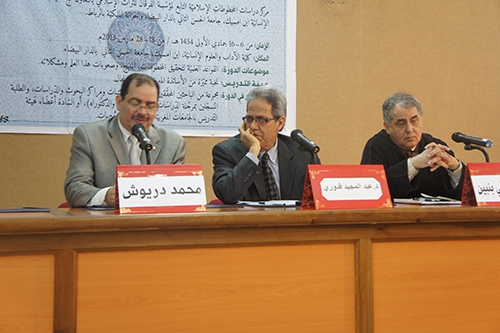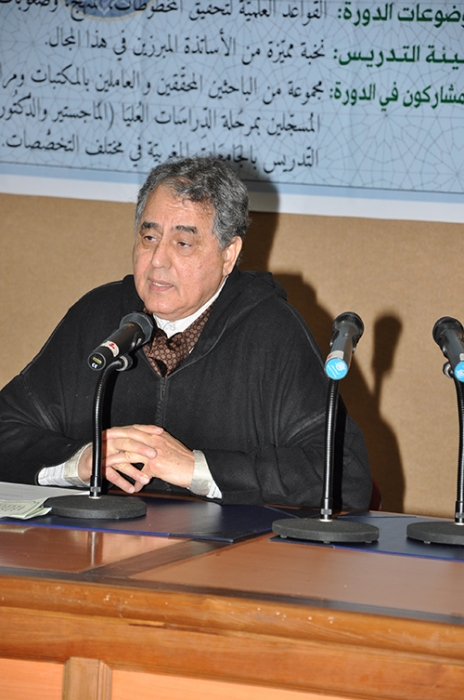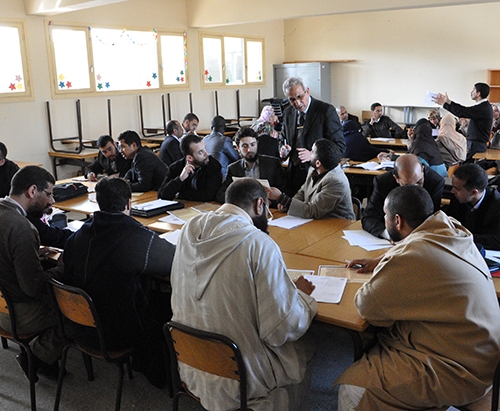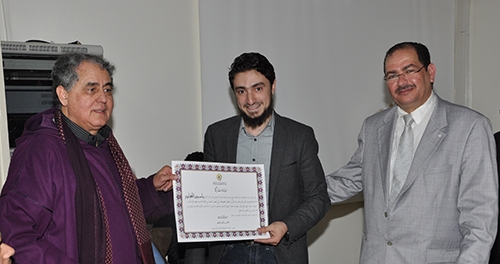The Centre for the Study of Islamic Manuscripts, part of Al-Furqān Islamic Heritage Foundation in London, in co-operation with the Faculty of Arts and Humanities Ben M’sik, the University Hassan II in Casablanca and the Royal Library (al-Khizana al-Malakiyya) in Rabat, successfully organised the first training course on editing manuscripts. It was considered to be the first of its kind to be organised by Al-Furqān in Morocco on the theme of editing manuscripts.
The course, held between the 18th and 28th of March 2013, at the Faculty of Arts and Humanities Ben M’sik, in Casablanca-Morocco, was made available to researchers in the discipline, employees of libraries and members of research centres. Applications were also encouraged from students enrolled on postgraduate studies. Members of the teaching faculty in Moroccan Universities from various academic backgrounds were also welcomed to apply.
Over 300 individuals applied, however due to space limitations only 60 could be admitted. The participants were made up of a wide spectrum of researchers, including highly qualified teaching staff and students from a variety of Arabic and African countries. The participants, some with a background in the field and others from research centres, came from as far afield as Yemen, Algeria, Libya, Kenya and Ghana. The course was also attended by lecturers from Morocco and other countries.
The course detailed the principals of editing manuscripts and its scientific basis. It also covered the methodology, challenges and hindrances that are part of the discipline. The manuscripts considered on the editiing course covered a wide array of subjects, including Ḥadīth, fiqh, science, arts, biographies, athbat (evidence) and Sufism.
The course featured two fundamental aspects: Theoretical lectures and practical workshops.

To introduce the course, Mr. Mohamed Drioueche, Head of the Projects and Publications Department at Al-Furqān, began by expressing his gratitude to the co-operating partners. He welcomed the guests: professors, participants and those from the University He especially thanked the University for its kind welcome and active interest in the discipline. He introduced Al-Furqān Foundation and the aims for which it had been established, and mentioned the most important activities it was taking part in, providing courses, cataloguing, conferences, delivering lectures and publishing books. He also highlighted the importance of these courses and the goals behind them in rekindling the interest and initiatives of trainees in the field - in addition to raising the level of knowledge on the subject, through introducing trainees to the most important Islamic manuscripts from an academic and historical stand point. He expressed how the courses also initiate a new generation of researchers to the field, who are then able to approach the subject of editing, documenting and researching with great skill and competence.

Professor Dr. Ahmed Shawqi Binebine, Director of Hasaniyya Library, then touched on the importance of such courses, whilst also cautioning that unless universities began to include them within their syllabi, there would be a fall in the number of able graduates to the field. Such courses, he added, allowed students and researchers to be introduced to the hands on, material study of manuscripts.
The Dean of the Ben M’sik Faculty of Literature and Human Sciences, Professor Dr. Abdul Majid Qaddouri then spoke of the importance of taking due care of one’s heritage, its study and its presentation to others. He compared it to the preservation of the historical memory of a civilisation. From this standpoint, he felt it of critical importance that the sciences involved in manuscript editing be tied to a societal project, all the while being open to other sciences.
After a break, the course proceeded with two lectures delivered by Professor Dr. Ahmed Shawqi Binebine. The first of which was titled: “The transition from the culture of hand writing to the culture of print”. The second lecture was titled: “The principals of scientific editing”.

With a packed schedule of lectures and workshops, the course continued. Attendees gained greater insight into the discipline of manuscript editing, cataloguing and researching. The course left an impression on the participants on the importance of the subject and the richness of their manuscript heritage. They were imbued with the sense of responsibility towards this heritage in all its forms, following in the footsteps of great scholars of the past.
The course was concluded on the 28th of March 2013. The representative of Al-Furqān and the Director of the Royal Library (al-Khizana al-Malakiyya) expressed their appreciation to the hosting University and their active effort to make the course a success. The representative of the professors and students also expressed their gratitude and appreciation towards Al-Furqān and presented a few recommendations from the trainees. At the end of the proceedings, the certificates were presented.

What was unique to this course was its attendance. A number of the participants had travelled great distances despite difficult circumstances. Furthermore, the contribution of the researchers’ through their interaction, questions, interjections and criticisms, added to the courses success. This was evident in the comments and appreciation expressed towards Al-Furqān and its Chairman, Sheikh Ahmed Zaki Yamani in particular. Attendees had, in their own words, found the course content to be unique and highly beneficial, characterised by its intensive programme and selection of able lecturers and researchers. This, in addition to its achieving its desired goals and the meticulousness exhibited in the organisation of the course. The participants urged the head of the Foundation to repeat such formative training courses in Morocco, but for a longer duration, especially in cities that contain public and private holdings of manuscripts so that benefit could be had by a wider audience of people and experts. They felt that to gain knowledge from a course, it required long hours of research and arduous effort, yet this had been usefully provided in a short and succinct manner, saving them much time and effort. There were also regrets expressed by many of those who had applied to the course, yet were unable to be included in the selection, due to the large number of applicants..

